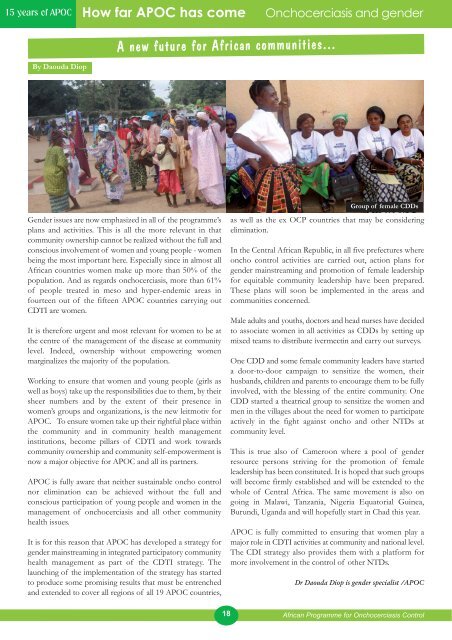15 years of APOC - World Health Organization
15 years of APOC - World Health Organization
15 years of APOC - World Health Organization
You also want an ePaper? Increase the reach of your titles
YUMPU automatically turns print PDFs into web optimized ePapers that Google loves.
<strong>15</strong> <strong>years</strong> <strong>of</strong> <strong>APOC</strong><br />
By Daouda Diop<br />
How far <strong>APOC</strong> has come Onchocerciasis and gender<br />
A new future for African communities...<br />
Gender issues are now emphasized in all <strong>of</strong> the programme’s<br />
plans and activities. This is all the more relevant in that<br />
community ownership cannot be realized without the full and<br />
conscious involvement <strong>of</strong> women and young people - women<br />
being the most important here. Especially since in almost all<br />
African countries women make up more than 50% <strong>of</strong> the<br />
population. And as regards onchocerciasis, more than 61%<br />
<strong>of</strong> people treated in meso and hyper-endemic areas in<br />
fourteen out <strong>of</strong> the fifteen <strong>APOC</strong> countries carrying out<br />
CDTI are women.<br />
It is therefore urgent and most relevant for women to be at<br />
the centre <strong>of</strong> the management <strong>of</strong> the disease at community<br />
level. Indeed, ownership without empowering women<br />
marginalizes the majority <strong>of</strong> the population.<br />
Working to ensure that women and young people (girls as<br />
well as boys) take up the responsibilities due to them, by their<br />
sheer numbers and by the extent <strong>of</strong> their presence in<br />
women’s groups and organizations, is the new leitmotiv for<br />
<strong>APOC</strong>. To ensure women take up their rightful place within<br />
the community and in community health management<br />
institutions, become pillars <strong>of</strong> CDTI and work towards<br />
community ownership and community self-empowerment is<br />
now a major objective for <strong>APOC</strong> and all its partners.<br />
<strong>APOC</strong> is fully aware that neither sustainable oncho control<br />
nor elimination can be achieved without the full and<br />
conscious participation <strong>of</strong> young people and women in the<br />
management <strong>of</strong> onchocerciasis and all other community<br />
health issues.<br />
It is for this reason that <strong>APOC</strong> has developed a strategy for<br />
gender mainstreaming in integrated participatory community<br />
health management as part <strong>of</strong> the CDTI strategy. The<br />
launching <strong>of</strong> the implementation <strong>of</strong> the strategy has started<br />
to produce some promising results that must be entrenched<br />
and extended to cover all regions <strong>of</strong> all 19 <strong>APOC</strong> countries,<br />
18<br />
Group <strong>of</strong> female CDDs<br />
as well as the ex OCP countries that may be considering<br />
elimination.<br />
In the Central African Republic, in all five prefectures where<br />
oncho control activities are carried out, action plans for<br />
gender mainstreaming and promotion <strong>of</strong> female leadership<br />
for equitable community leadership have been prepared.<br />
These plans will soon be implemented in the areas and<br />
communities concerned.<br />
Male adults and youths, doctors and head nurses have decided<br />
to associate women in all activities as CDDs by setting up<br />
mixed teams to distribute ivermectin and carry out surveys.<br />
One CDD and some female community leaders have started<br />
a door-to-door campaign to sensitize the women, their<br />
husbands, children and parents to encourage them to be fully<br />
involved, with the blessing <strong>of</strong> the entire community. One<br />
CDD started a theatrical group to sensitize the women and<br />
men in the villages about the need for women to participate<br />
actively in the fight against oncho and other NTDs at<br />
community level.<br />
This is true also <strong>of</strong> Cameroon where a pool <strong>of</strong> gender<br />
resource persons striving for the promotion <strong>of</strong> female<br />
leadership has been constituted. It is hoped that such groups<br />
will become firmly established and will be extended to the<br />
whole <strong>of</strong> Central Africa. The same movement is also on<br />
going in Malawi, Tanzania, Nigeria Equatorial Guinea,<br />
Burundi, Uganda and will hopefully start in Chad this year.<br />
<strong>APOC</strong> is fully committed to ensuring that women play a<br />
major role in CDTI activities at community and national level.<br />
The CDI strategy also provides them with a platform for<br />
more involvement in the control <strong>of</strong> other NTDs.<br />
Dr Daouda Diop is gender specialist /<strong>APOC</strong><br />
African Programme for Onchocerciasis Control

















